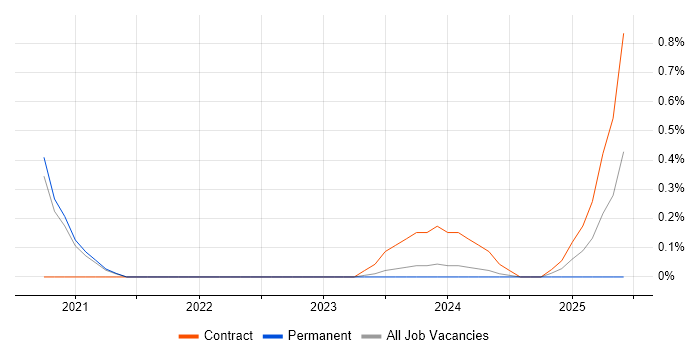MEAN Stack (MongoDB, Express.js, Angular, Node.js)
South Yorkshire > Sheffield
The table below provides summary statistics for contract job vacancies advertised in Sheffield requiring MEAN Stack skills. It includes a benchmarking guide to the contractor rates offered in vacancies that cited MEAN Stack over the 6 months leading up to 17 July 2025, comparing them to the same period in the previous two years.
|
|
6 months to
17 Jul 2025 |
Same period 2024 |
Same period 2023 |
| Rank |
62 |
- |
- |
| Rank change year-on-year |
- |
- |
- |
| Contract jobs citing MEAN Stack |
2 |
0 |
0 |
| As % of all contract jobs advertised in Sheffield |
0.42% |
- |
- |
| As % of the Libraries, Frameworks & Software Standards category |
2.17% |
- |
- |
| Number of daily rates quoted |
2 |
0 |
0 |
| Median daily rate (50th Percentile) |
£500 |
- |
- |
| South Yorkshire median daily rate |
£500 |
- |
- |
MEAN Stack falls under the Software Libraries and Frameworks category. For comparison with the information above, the following table provides summary statistics for all contract job vacancies requiring technical specification, industry standards, software libraries and framework skills in Sheffield.
| Contract vacancies with a requirement for technical specification, industry standards, software libraries and framework skills |
92 |
107 |
71 |
| As % of all contract IT jobs advertised in Sheffield |
19.21% |
25.06% |
17.07% |
| Number of daily rates quoted |
65 |
66 |
61 |
| 10th Percentile |
£358 |
£415 |
£388 |
| 25th Percentile |
£389 |
£464 |
£456 |
| Median daily rate (50th Percentile) |
£447 |
£530 |
£575 |
| Median % change year-on-year |
-15.66% |
-7.83% |
+15.00% |
| 75th Percentile |
£538 |
£622 |
£700 |
| 90th Percentile |
£650 |
£650 |
- |
| South Yorkshire median daily rate |
£449 |
£550 |
£550 |
| % change year-on-year |
-18.45% |
- |
+12.24% |

